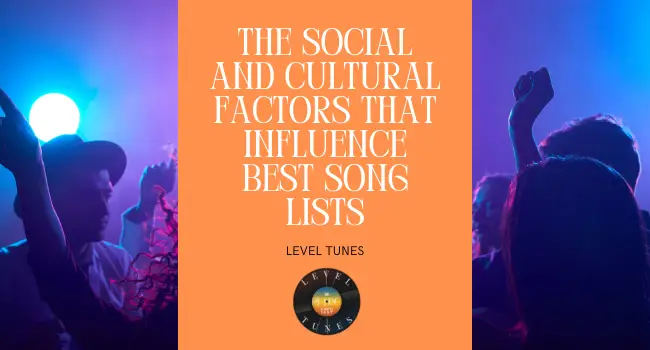The Social And Cultural Factors That Influence Best Song Lists: A Look At How Societal Trends Shape Music Criticism
Hey there, fellow music enthusiasts! Have you ever wondered what makes a song ‘the best’? Is it the catchy melody? The relatable lyrics? Or perhaps something deeper – like societal trends and cultural influences?
In this article, we’ll delve into the social and cultural factors that shape our perception of music. From political climates to fashion trends, everything around us plays a role in how we view and critique songs.
We’ll explore how these external forces have influenced some of the greatest song lists of all time – from Rolling Stone’s 500 Greatest Songs of All Time to Billboard’s Hot 100 chart.
So sit back, grab your headphones, and let’s dive into the fascinating world of music criticism!

The Evolution Of Music Criticism
Music criticism has come a long way since the early days of classical music reviews. As the world evolved, so too did our methods of critiquing and discussing music.
In fact, it wasn’t until the 1960s that rock critics were even considered legitimate members of the journalism community.
Today, with the rise of social media and user-generated content, anyone can be a critic – for better or worse.
But while opinions are now more democratic than ever before, some things remain constant: good writing is still king, and well-researched analysis is key to separating oneself from the amateur pack.
It’s a brave new world out there for music critics – but if we stay true to our roots while embracing modern technology, who knows what kind of sonic revolutions await us in the future?
The Role Of Social Media In Music Criticism
As music criticism evolved over time, so did the ways in which it was shared and consumed. With the advent of social media platforms like Twitter and Instagram, anyone with an opinion can become a self-proclaimed critic. This democratization of music criticism has led to a more diverse range of voices being heard, but also raises questions about the validity and influence of these opinions.
The role of social media in shaping best song lists cannot be ignored. From trending hashtags to viral TikTok dances, societal trends have a major impact on what songs are deemed ‘worthy’ by critics and fans alike. Social media influencers often hold significant sway over their followers’ musical tastes, leading to sudden spikes in popularity for certain artists or genres.
However, this trend-chasing mentality can also lead to a homogenization of music criticism, where everyone is simply following the same popular trends instead of exploring new and innovative sounds.
The rise of influencer culture has blurred the lines between genuine artistry and manufactured hype.
Memes and internet jokes surrounding certain songs can sometimes overshadow their actual quality as pieces of music.
Nostalgia plays a big role in determining what songs make it onto best-of lists, with many people clinging to beloved classics from their youth rather than embracing newer sounds.
The Impact Of Cultural Diversity On Music Criticism
As society becomes more diverse, the impact of cultural diversity on music criticism has become increasingly significant. The influence of different cultures can be seen in the way that music is created and consumed, but it also affects how we critique and appreciate songs.
To illustrate this point, let’s take a look at three different elements: rhythm, melody, and lyrics. In many African cultures, for example, rhythm is often emphasized over melody or harmony.
This means that when an African artist releases a song with complex rhythms, someone from another culture might not understand why it’s so popular.
Similarly, some Asian music genres use melodies that are unfamiliar to Western ears. Meanwhile, Latin American artists often focus heavily on lyrics – sometimes even using their songs as political platforms – which may not resonate with listeners who don’t speak Spanish or Portuguese.
| Element | Cultural Influence | Example |
|---|---|---|
| Rhythm | African Music | Complex polyrhythms in Afrobeat |
| Melody | Asian Music | Unfamiliar pentatonic scales in J-Pop |
| Lyrics | Latin American Music | Political messages in Reggaeton |
As you can see from the table above, cultural diversity plays a major role in shaping our understanding of music. It’s important for critics to keep these differences in mind when evaluating songs from different parts of the world.
By doing so, we can better appreciate the nuances of each genre and respect the unique perspectives they bring to the table.
So next time you’re listening to a new track by an international artist, remember that what might sound strange or unfamiliar could actually be influenced by centuries-old traditions from across the globe!

The Influence Of Technology On Music Criticism
Nowadays, technology has become an integral part of our lives, and it’s no different in the world of music. With streaming services like Spotify and Apple Music dominating the market, we now have access to a vast library of songs at our fingertips.
This has not only changed the way we consume music but also how we criticize it. Music critics are no longer limited to listening to albums on CD or vinyl; they can stream them online from anywhere in the world. This means that even the most obscure artists can receive attention from critics worldwide, leading to a more diverse range of opinions.
However, this freedom comes with its own set of challenges as well.
With so much music available, critics must sift through countless tracks before finding something worth reviewing – which is why some argue that there’s less emphasis on quality over quantity these days.
Moreover, social media platforms have given rise to new forms of criticism – think about Twitter threads dissecting every aspect of an album or YouTube reviews filled with memes and witty commentary. It’s clear that technology has transformed both the medium and tone of music criticism while making it more accessible for anyone with a smartphone or laptop.
In conclusion (just kidding), technology has undoubtedly influenced how we approach music criticism today. While some may lament the loss of traditional methods such as visiting record stores or reading print magazines, others embrace change as an opportunity for growth and innovation. Regardless, one thing remains true: society will continue shaping music criticism trends just as it does with everything else in life.

The Future Of Best Song Lists And Music Criticism
Now that we have delved into the social and cultural factors shaping best song lists, it’s time to look towards the future of music criticism. As society continues to evolve at a rapid pace, so too will our tastes in music. With advancements in technology and new platforms for artists to share their work, the role of the music critic is more important than ever.
So what can we expect from the future of best song lists and music criticism? Here are four potential trends to keep an eye on:
- Increased focus on diversity and representation in music
- Integration of artificial intelligence in creating personalized playlists
- Greater emphasis on live performances and concert experiences
- Collaboration between critics and musicians for a more nuanced perspective
The continued rise of streaming platforms and their impact on the music industry’s revenue model.
Frequently Asked Questions
What Are Some Examples Of Specific Societal Trends That Have Influenced Music Criticism In Recent Years?
Alright folks, let’s dive into the nitty-gritty of what societal trends are currently shaping our beloved music criticism.
First off, we can’t ignore the elephant in the room: social media. With platforms like Twitter and Instagram dominating our daily lives, it’s no surprise that musicians are now being judged on their online presence just as much as their actual music (cue eye roll).
But beyond that, we’ve also seen a rise in socially conscious lyrics and themes in recent years – think Beyonce’s ‘Formation’ or Kendrick Lamar’s entire discography. It seems like listeners these days aren’t satisfied with just catchy beats and empty words; they want their favorite artists to have something important to say about society and culture.
And finally, let’s not forget about the impact of streaming services like Spotify and Apple Music. These platforms have made it easier than ever for us to access an endless array of new music, which means critics have more options than ever before when compiling those coveted end-of-year lists.
So there you have it, folks – some specific examples of how our current societal landscape is influencing the world of music criticism.
How Do Music Critics Balance Their Personal Tastes With The Expectations And Preferences Of Their Audience?
As music critics, we have the daunting task of balancing our personal tastes with the preferences and expectations of our audience. It’s like trying to please your significant other’s parents while staying true to yourself – a delicate dance that requires finesse and tact.
We’ve all been there, listening to an album or attending a concert and thinking ‘this is amazing,’ only to realize that it may not be everyone’s cup of tea. So how do we navigate this tricky terrain?
Do we pander to the masses or stay true to our own musical compass? The answer is simple: both. As music critics, we must strike a balance between being authentic and relatable, offering insights into what makes a particular artist or song great while also acknowledging the diverse tastes of our readership.
Can Music Criticism Be Considered A Form Of Cultural Commentary Or Social Analysis, And If So, How?
Music criticism has often been dismissed as mere subjective opinions of self-proclaimed experts. But what if I told you that it’s more than just a matter of personal taste?
Yes, my dear readers, music criticism can be considered a form of cultural commentary or social analysis!
We critics are not just here to tell you whether we like the beat or not; we’re also here to reflect on how music reflects and shapes our society.
From analyzing lyrics that speak volumes about societal issues to scrutinizing the representation (or lack thereof) of marginalized groups in the industry – there’s so much more to unpack beyond catchy choruses and melodies.
So next time you read a review, remember that it’s not just about whether the critic likes it or not – it’s an opportunity for us all to engage with music as a reflection of our culture.
How Have Changes In The Music Industry, Such As The Rise Of Streaming Services, Affected The Way Music Is Evaluated And Critiqued?
The music industry is constantly evolving, and with the rise of streaming services, it’s no surprise that the way we evaluate and critique music has also changed.
As a music critic, I’ve noticed how these changes have affected the way we consume and discuss new releases. With instant access to millions of songs, listeners are less likely to take their time to fully immerse themselves in an album before forming an opinion. Instead, quick first impressions often dominate online discourse.
Additionally, algorithms that recommend similar artists or tracks can limit our exposure to diverse sounds and genres. While this may be convenient for some listeners, it raises questions about what truly constitutes good music criticism in the age of streaming.
What Role Do Commercial Considerations, Such As Album Sales Or Chart Performance, Play In Determining The Quality Or Value Of A Particular Song Or Artist?
When it comes to evaluating music, there’s no doubt that commercial considerations play a big role. Album sales and chart performance are often used as indicators of an artist’s success or value in the industry.
But do they really determine the quality of a particular song or artist? As music critics, we need to take a step back and consider whether these factors truly reflect the artistry and creativity behind each piece of music.
Sure, catchy hooks and radio-friendly beats may help boost an artist’s popularity, but does that mean their work should be considered superior to more experimental or unconventional styles?
At the end of the day, it’s up to us as listeners and critics to decide what truly makes a great song – regardless of its commercial success.
All in All
In conclusion, it is clear that social and cultural factors have a significant impact on music criticism. From the emergence of new genres to the influence of digital media on how we consume music, there are many trends shaping our perceptions of what makes a ‘best’ song list.
As music critics, we must balance our own personal tastes with those of our audience in order to remain relevant and stay true to our craft. At the same time, we cannot ignore the larger societal forces at play when evaluating artists and their work.
Ultimately, the best song lists reflect not just individual preferences but also broader cultural attitudes and values. By considering these factors alongside musical quality and technical skill, we can create more nuanced and insightful critiques that truly capture the essence of contemporary music culture.
Thanks for reading
TBone




